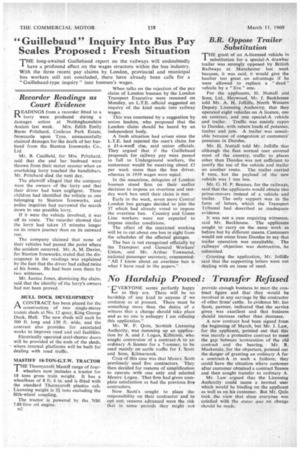No Hardship Proved : Transfer Refused
Page 56

If you've noticed an error in this article please click here to report it so we can fix it.
" EVERYONE seems perfectly happy as they are. There will be no hardship of any kind to anyone if we continue as at present. There must be something more than the desire of a witness that a change should take place and as no one is unhappy I am refusing this application."
Mr. W. F. Quin, Scottish Licensing Authority, was gumming up an application by A. and J. Logan, Kilbirnie, who sought conversion of a contract-A to an ordinary A licence for a 7-tonner, to be used mainly on cattle traffic for J. Scott and Sons, Kilmarnock.
Crux of this case was that Messrs. Scott previously used five contractors. They then decided for reasons of simplification to operate with one only and selected Messrs. Logan. That firm had given cornplete satisfaction as had the previous five contractors.
Now Scott's sought to place the responsibility on their contractor and to opt out; reasons advanced were the risk that in some periods they might not
provide enough business to meet the contract figure and that they would be involved in any carriage by the contractor of other firms' cattle. In evidence Mr. Ian Scott, partner, indicated that the service given was excellent and that business should increase rather than decrease.
A new contract had been signed from the beginning of March, but Mr. J. Law, for the applicant, pointed out that this was merely a protective contract to meet the gap between termination of the old contract and the hearing. Mr. R. Mackenzie, for the objectors, pointed out the danger of granting an ordinary A for a contract-A in such a fashion; they could have the situation where customer after customer obtained a contract licence and then sought transfer to ordinary A.
Mr. Law argued that the Licensing Authority could name a normal user which would be binding on the applicant as well as on his customer. But Mr, Quin took the view that since everyone was satisfied with the status quo no change should be made.




































































































































